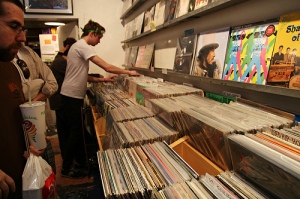Update: Read our breakdown of Music Discovery in 2010 here.
Long gone are the days of browsing through record stores to find new music (record stores are still awesome hangouts though), making physical mixtapes for your friends (except for the nostalgic among us), and putting CDs on your Christmas list (iTunes gift cards anyone?). Digital technologies and the seemingly endless supply of online music destinations have forever changed the way we discover the tunes we like.
Born out of my own frustration with the retardedly over-crowded “music discovery” space, this post aims to sift through the plethora of sites, many of which are variations of the same concept, and pinpoint the best ones.
Do you prefer to listen to short clips of top downloads on iTunes because it’s easy? (Ya, iTunes is more of a place to buy a song/album that you know you want, but you can definitely discover new stuff by poking around, checking the free download of the week etc). Are you a fan of one of the numerous music social networking sites that let you discover people with similar musical taste, create/share playlists, or track down obscure indie bands? Or do you love Pandora’s almost-no-work-involved recommendation system?
We’re all different when it comes to our preferred methods of music discovery, but the end goal is the same, right? We want to consistently discover new music that resonates with us personally – bands we can go see live, music to download, artists we can relate to. There are so many places to do this now it makes my head spin, so I needed to simplify.
With that, here are my top 5:
Pandora
I’ve been a fan of Pandora for a long time. The internet radio station, with its robust recommendation system based on the work of 50 analysts who break songs down into musical attributes, is surprisingly good at finding music that suits your tastes. And with the thumbs-up/thumbs-down rating system, the more you use it the smarter it gets. Their Facebook app is certainly convenient too.
iLike
If you can put up with 30 second clips, iLike is great for discovery. The fact that it can be plugged into Facebook, iTunes, MySpace, Bebo and others makes it a versatile social platform and is probably why they have so many registered users making profiles, sharing playlists and the like. And you can get lots of free music from new artists.
Fuzz
“Music Uprising…Connecting people who create and love music”. Other than having pretty good music discovery tools, I like Fuzz because I like the Fuzz Manifesto. This is the kind of mentality that I think everyone in the music industry needs to adopt, and soon, in order to survive and thrive in the exciting new frontier that is developing. Open, participatory, fair etc…
Grooveshark
In addition to letting you listen to any song in its entirety, Grooveshark rewards you for sharing music with people by giving you credits for free music. It also serves as an online library so you can store your music and access it from anywhere. There is a tagging/ranking system to help you find what you want as well as playlist creation/sharing.
Last.fm
Easily one of the most dominant players in the social music discovery space, Last.fm has a powerful recommendation engine based on data from the user community (unlike Pandora’s engine which matches similar musical attributes). Worth noting here is that Last.fm is now paying royalties to unsigned artists – and thus providing an alternative for artists who are not part of SoundExchange.
If this list is too short for you, check Mashable’s Music News Toolbox: 50+ Links for Discovering New Music to read about sites like iJigg, MOG, Goombah, Music Nation, and many more. Or leave us a comment with your favorite ones.
And of course, soon you will be able to discover kick-ass new music at MixMatchMusic. Stay tuned.




